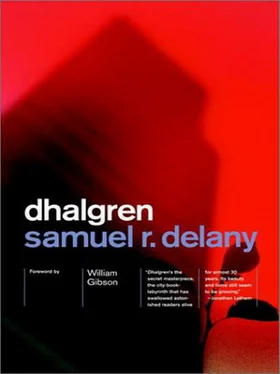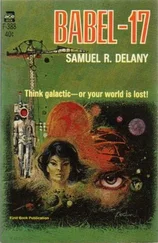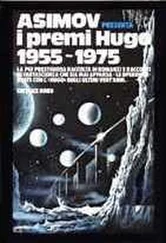"We're going to the observatory." Kamp opened another door.
The organ piece ended; after a slight pause, a long note bent. Then another… They were playing Diffraction.
Kid smiled as he walked after Kamp down a hall nearly black. He could hear Lanya's whistle. At the top of a stairway Kid saw faint light. The carpeting was thick and so warm under his bare foot he wondered if there were heating on.
"I suppose it wouldn't be so bad if Roger was here. But being left in charge of a party for a bunch of people that, frankly, I'd put out of my house…"
Kid was quietly amazed and wondered what Kamp was thinking in the pause.
"…I just don't know what to do. Do you know what I mean?"
Anything, Kid thought, I say will sound angry and stupid. He said, "Sure," and followed Kamp up the stairs.
"A few months ago," Kamp said, "I was in some experiments. They didn't have anything to do with the moon. In fact I had to get a special release from the Space Program to participate. Some students of a friend of mine at Michigan were running tests, and I guess he thought it would be a feather in his cap to get me for a guinea pig. Now, it'd been so long since I had anything to do that wasn't in some way connected with the Program, I went along with it. They were experiments on sensory deprivation and overload." At the head of the steps, Kamp waited for Kid before starting up a third flight.
He led Kid across a brick floor to a double doorway.
"I was in the overload part. It was all pretty amateurish, actually."
Kid stepped onto what first seemed a semi-circular balcony.
Faintly, below, a room full of people began to clap in time to the music—
"I guess they'd all been reading too many articles on LSD—"
— and shouted.
"— I took LSD back in the late fifties — more tests, that this psychiatrist friend of mine was running. But I've always been a little ahead of what's going on. Anyway, I know what it's like, LSD. And I'm pretty sure most of those kids setting up those experiments in Michigan didn't."
The terrace was enclosed in a glass dome. In the center was a six-foot in diameter celestial globe of clear plastic. Light from the garden below struggled in the smoke above, glowing like dilute milk.
"Now I guess you've taken LSD and all that stuff."
"Sure."
"Well, all they'd been doing was looking at all the pretty pictures everyone had been drawing." Kamp touched the globe, removed his fingers. Ares passed across Libra. The stars were glittering stones set in the etched constellations. "They had spherical rear-projection rooms, practically as big as this place here. They could cover it with colors and shapes and flashes. They put earphones on me and blasted in beeps and clicks and oscillating frequencies. Anyway, I was supposed to pick out patterns from all this. Later I learned that mine was the control group: We were given no patterns at all. I was told all the ones I had seen I had imposed myself… But after two hours of testing, two hours of fillips and curlicues of light and noise, when I went outside, into the real world, I was just astounded at how… rich and complicated everything suddenly looked and sounded: The textures of concrete, tree bark, grass, the shadings from sky to cloud. But rich in comparison to the sensory-overload chamber. Rich… and I suddenly realized what the kids had been calling a sensory overload was really information deprivation. It's the pattern that colors and shapes assume that tell you whether it's a cow or a car you're looking at. It's the very finest alternations in color differentiation over a surface that tell you whether it's maple or pine, styrene or polyethylene, linen or flannel. Take any view in front of you and cut off the top and bottom till you've only got an inch-wide strip and you'll still be amazed at all the information you can get from just running your eye along that. Well, all this started me thinking back to the moon. Because that had been a place — and it happened in every mile en route — where standard information patterns just broke down. And yet, that's something we haven't been able to talk about — to anyone — since we got back. We'd trained for prolonged free-fall by spending time underwater in diving suits. I remember when we actually hit sustained weightlessness, I broadcast back, 'Hey, it's just like being underwater!' and yet as I said that into the chin mike, I was thinking: You certainly could never mistake the two conditions for one another. But I couldn't think of any way to say what was different about it, so I just described the way everybody, who'd never been there themselves, had told me it was going to feel like. Later I thought, that's like telling someone the world is flat and sending him off to the edge; but because he doesn't know quite how to describe such gentle roundness, he mumbles and stammers and says, 'Well yeah, I was at the… edge.' And the thing about the moon itself, the one thing I've really never told anybody, because I don't think I would have known how before those experiments: it's another world, and when you're there, you have no way of knowing what anything means. Physically. That whole landscape tells you nothing about itself, on any level, in the way that the most desolate stretch of sand on earth tells you about winds that have blown over it, rains that have or have not fallen, or the feel it might have beneath your feet if you walked across it. 'An airless, waterless void…' the way they say in all the science-fiction stories? No, that refers to some desert on earth, or what space between the stars looks like when you're safely tucked under the atmosphere. The moon is a different world, with a different order that you don't understand. There isn't that richness — not because it isn't in bright colors, or because it's all brown, purple, and grey. It's because as you run your eyes over the rocks and dirt, you have no way to know what the tiny alterations in color mean. Even though it has a horizon and perspective, and… well, rocks and dirt, it's more like being in that sensory-overload chamber than anything else. And of course, it isn't like that at all. It wasn't horrible. Horror still has something to do with earth. I suppose it was frightening. But even that was absorbed in the excitement of it. I—" he paused—"do not know how to tell you about it." He smiled and shrugged. "And that's probably the one thing I really haven't told anybody before. Oh, I've said, 'You can't describe it. You'd have to be there.' But that's my first wife telling her mother-in-law about the time we went to Persia. And that isn't what I mean."
Kid smiled back and wished he hadn't.
It isn't his moon I distrust so much, he thought, as it is that first wife in Persia. "I understand," he said, "as much as I'll let myself."
"Maybe," Kamp said after a moment, "you do. Let's go back down to the party."
Walking down the steps, Kid felt self-betrayed and wondered if there were any benefit from the feeling. He wanted to find Lanya and Denny.
Outside on the terrace, while the Captain, beside him, looked around as if for someone else to talk to, Kid thought: I feel the responsibility for him now he probably hoped I felt the night I walked him up here. That is not right, and I don't like it.
Ernestine Throckmorton said, "Captain! Kid! Ah, there you are," and began to talk definitely only to Kamp.
Kid excused himself, wondering whether she really was an angel, and went down into the gardens.
Lanya was crossing the bridge in a fury of emerald and indigo.
"Hey," he said. "Have you seen Denny?"
She turned. "You haven't. He's feeling abandoned."
Paul Fenster, holding his drink beneath his chin, stepped around Kid and said: "Jesus Christ, you'll never believe what was going on back there in April. I didn't think I was going to be able to make it." He laughed.
Читать дальше












